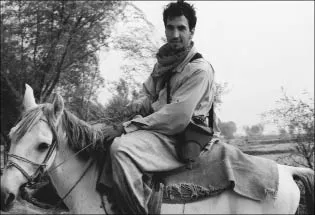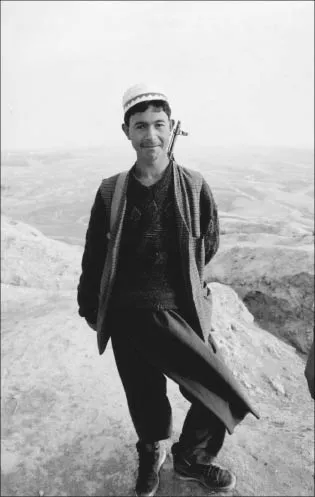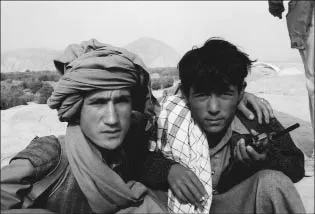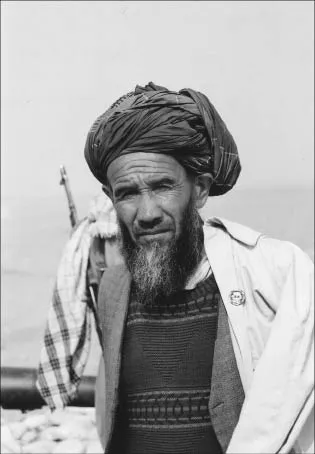Four
War
The teenaged soldier standing behind a desk in the hut that served as a border post on the Afghan side of the river squinted at my passport. It was almost pitch black inside. I fished a flashlight out of my pocket and shone the beam at the stamp from the Afghan embassy in Dushanbe. The border guard stared at it studiously. It wasn’t clear that he could read. He looked at me and beamed.
“Baleh,” he said. Okay.
A few minutes later Arvind, Dr. Awwad, and I were squeezed into a Russian jeep heading east over dried and deeply rutted mud. There was no real road. Dr. Awwad spoke decent Farsi because of his Persian wife and could converse with our driver. He was taking us to Khodja Bahuddin, the village where Ahmed Shah Massoud had been assassinated by al-Qaeda agents a few weeks before. The Northern Alliance would give us a place to sleep there. Our progress was little faster than walking speed, given the condition of the ground below us and of the decades-old vehicle we drove in. But slowly the sounds of war became increasingly muffled and then almost imperceptible. We pulled into the village and then to a walled compound with a sheet metal gate guarded by a soldier slouched in a white plastic chair. He roused himself to open the gate as we climbed out of the jeep and then settled in to sleep again.
Inside were a few canvas tents with the logo of the Red Crescent Society stencilled on them and several mud-walled and concrete buildings. Although it was well after midnight and the sky showed no hint of dawn, light shone from one of them. I approached and called out softly. The woman who came to the door looked Southeast Asian but spoke with a flat American accent. Her face was clean. Her hair looked washed and brushed. I realized she must have been a television reporter.
“Yes?” she said.
I looked past her to what appeared to be an empty room, save a few cameras and bags piled near the walls. A kerosene lamp provided the light.
“Hi. We’ve been in a jeep or digging through sand for most of the last twenty-four hours. We just arrived. We’re really tired. Can we sleep inside on the floor until morning?”
“No. I’m sorry. NBC has the building.”
“I beg your pardon?”
“NBC has this building. They told me I could sleep here, but they can’t let anyone else in.” She tried to smile. She couldn’t.
I was furious. “NBC doesn’t have this building. It belongs to the Northern Alliance. They’re letting you stay here. They’re letting us stay here, too. Who the hell are you to stop them?”
I was getting really worked up. Every Afghan I had met, from the exiles in Peshawar the previous year, to those in Dushanbe the week before, had shown me humbling hospitality. And now this American woman was playing gatekeeper. I was on the verge of losing my temper completely. But then Dr. Awwad was behind my right shoulder.
“It’s okay,” he said, holding an upraised palm toward me and speaking in low and even tones. “It will be morning soon anyway.”
I felt my outrage draining away. I was exhausted.
The building had a concrete base with a flat ledge that extended beyond its walls and above the sand below. From my bag I pulled the blanket from the Dushanbe hotel, and another thin woollen one I had bought in Pakistan the year before. Dr. Awwad, Arvind, and I lay beneath them. The temperature outside was a little above zero. The concrete beneath us was cold to touch. I felt myself shaking. I rummaged in my bag and pulled out a toque. I awoke a couple of hours later with the sun cresting the horizon and NBC crew members stepping over us on their way to the latrine.
It took me a few moments to realize where I was. The previous day I had woken up in a bed, in a hotel, in another country. Now there was a bearded man on one side of me and sand on the other. The compound had been built on a slight plateau, meaning that when I sat up, I could see dozens of mud-walled homes spilling away from the hillside, and just above them the sun, looking like a burning red disc as it shone through the heavy dust that hung in the air. The building where al-Qaeda agents had murdered Massoud was nearby. Blasted smoke stained its walls. The Northern Alliance had an operating base here and would feed and shelter us for twenty dollars a day. Locals who spoke English, or who pretended to do so, knew there were journalists here and had come looking for work. Anyone with a car did the same. I ate the breakfast provided by the Northern Alliance — flatbread and tea — and split the cost of a driver with Arvind and Dr. Awwad. I also hired a young man who assured me his English was strong to work as my translator. We decided to head straight for the front lines.
The front was only ten or fifteen kilometres away, but it took us a couple of hours to get there. The trip was one I would take dozens of times over the next few weeks. There wasn’t a proper road anywhere, but the mud walls of buildings in the village were spaced far enough apart to allow a jeep to pass between them. We would drive south out of the compound, through the market on the edge of town where the money-traders worked and where it was possible to buy potatoes and onions and, occasionally, a live chicken. Then west over rutted dirt toward the front. Our exact route would change depending on exactly where we were going, but inevitably we would reach the Kocha River and would have to leave the jeep behind. There we would hire horses to cross the river and continue over ground that provided more cover in the form of trees and gullies as we neared Taliban lines.
The author near Taliban lines, October 2001.
In the weeks to come, I would recognize that between Khodja Bahuddin and no man’s land, there were always places along the way at which point going farther would mean a sharp increase in danger. It was relatively safe, for example, to stop at the Northern Alliance strongpoint of Ai-Khanoum, the hilltop ruins of a city Alexander the Great founded more than 2,000 years ago. Amid pottery shards and a beautifully preserved pediment from a Corinthian column, it was possible to see for miles in every direction and count the puffs of smoke that rose in the distance from the impact of shells or bombs. The Taliban never seemed able to come close to hitting it with artillery and would have had to scale a cliff to get there in person. But beyond Ai-Khanoum there were stretches of open ground, places where you would have to leave the shelter of a hill to move forward, or a forest that became too sparse to hide your movement. The problem was that in isolation, each decision seemed small and inconsequential. We’ll drive quickly to that next hill; it won’t take more than five minutes. I barely hear any shooting; let’s move up a bit. Nobody can see us here. Then, an hour or two later, you’d find yourself in the midst of a firefight and wonder how you got there.
On this morning, however, I understood none of this. As we coaxed our horses into the cool waters of the Kocha River, the sounds of explosions and sputtering machine guns wafted over us. But I was so captivated by the beauty of the valley, so pleased to be on a horse, so excited to be nearing a battle, that it never occurred to me to worry. It is only possible to be that naïve and that ignorant about war once. Soon I would barely recognize the thrill I felt that morning. And, of course, it seems foolish to admit to those emotions now. But I suspect that any journalist who has covered conflict and denies feeling a similar rush of heightened emotions upon first approaching the sound of gunfire is being less than truthful, or else has forgotten.
A Northern Alliance fighter at Ai-Khanoum, a hilltop fortress founded by Alexander the Great.
We reached a small hill and scrambled to the top, where six men and boys huddled in a small dugout with a heavy machine gun and several AK-47 assault rifles. It wasn’t until I heard shells whistling over our heads and saw smoke rising from explosions both in front of us and behind us that I realized how exposed we were. I asked one of the teenagers what he was fighting for.
“He says Taliban very, very bad,” my translator relayed to me. “If he sees one, he will kill him.”
I scratched in my notebook. Not a bad quote, I thought. Vivid stuff.
“How long have you been here?” I asked.
“Taliban very, very bad,” came the response by way of my translator. “He will kill them.”
A couple more exchanges like this and it dawned on me that my translator’s English consisted of little more than a few dozen phrases he had memorized. The deceit had earned him a hundred bucks.
Fortunately, thanks to Dr. Awwad’s Farsi, we were able to communicate with the fighters on the hill. They were all young. The commander of the little hilltop garrison, Shah Wali, was twenty. Those under him were teenagers. They smiled a lot. One had lost a leg to a landmine. The shin and knee of another, Mohammad Hussein, were crisscrossed with raised white welts of scar tissue. He pointed to the village below us, where he had been hit during a Taliban attack the previous year. He lost consciousness and woke up in a hospital. When he could walk again, he came back to the front. A third, Kharmoh Mohammad, had also been shot.
They told us that the Taliban were foreigners and terrorists, not real Afghans. They wanted peace. I dutifully wrote it all down in my notebook. Then they said they were homesick. Mohammad had been fighting for two years, since he was sixteen, and had not seen his family all that time. For Wali, it had been three years. Both were illiterate and asked me to write a letter to their mothers. “Tell her I’m okay.” I took a photo to include in the letter. They posed with their arms wrapped around each other and their chests thrust out. The turban Mohammad wrapped above his beardless face looked oversized, as if he were dressing up. It was getting late. We picked our way back down the hill. I looked up. Mohammad and Wali were still waving from the crest of the hill. They seemed small. I waved back.
Northern Alliance fighters Shah Wali and Kharmoh Mohammad hold a hilltop dugout facing the Taliban.
One of the pleasures of reporting from northern Afghanistan at that time was freedom of movement. I was staying in a mud compound that lacked the security and comforts of the fortified military bases where journalists who arrived later in the war would typically stay. But then I imagine many of them experienced Afghanistan from a much greater distance. I didn’t see a Western soldier the entire time I was in Afghanistan that trip. Few were there during the early months of the war. Most on the ground were secretive American special forces. Occasionally, talking to Afghan soldiers in a dugout opposite Taliban lines, one would tell me that an American had been there the night before, scouting Taliban positions. Soon after the bombs would come.
I never needed to hire an armed guard, either. When I wasn’t conducting interviews, even a translator or guide wasn’t necessary. I’d simply leave the compound and keep walking. It helped that I typically wore my shalwar kamiz with an Afghan blanket slung over my shoulders. The outfit wouldn’t have fooled anyone who looked too closely, but it meant that the orphans and other children who ran in packs through the town ignored me.
An elderly man near the Northern Alliance strongpoint of Ai-Khanoum.
My favourite destination was the one teahouse in Khodja Bahuddin. It wasn’t open all the time and rarely served meat. The building was a concrete box about the size of a truck trailer. The few windows had no glass, only dirty plastic sheeting that kept out the worst of the weather. Inside there were no chairs, plates, or cutlery. Patrons, all men, sat on the floor and ate greasy rice with raisins off plastic mats on floor. On good days they’d also serve kebabs of mutton, goat, and beef. When the customers were armed, they would simply lean their Kalashnikovs on the wall behind them before squatting on their heels or sitting cross-legged to eat.
Since Khodja Bahuddin was situated so close to the front lines, and there was some very basic medical care available, it was home to many soldiers and civilians who had been injured by the war. Most of them, it seemed, had lost their legs or their limbs had been mutilated. Tens of millions of landmines lay all over the country. More than a decade after the Soviet withdrawal, Russian munitions continued to kill and maim. Mines scattered since by feuding warlords and by the Northern Alliance and the Taliban added to the carnage. In Khodja Bahuddin’s cramped hospital, built and supplied by Iran, Dr. Ashraf Aini told me he received so many landmine victims that medical staff with no formal medical training were forced to perform amputations. Aini himself worked almost continuous twelve-hour shifts. He had a wife and children and saw them once or twice a week.
Victims typically loitered on the steps of a nearby mosque, which is where I met Ghullam Ali as he sat cradling aluminum crutches in his lap. His legs were covered in stitches and thick scabs from toes to thighs. His right ankle was wrapped in a dusty bandage, now discoloured by blood and pus. Only two weeks earlier, Ali was a commander in the Northern Alliance with men under him. He led an attack against Taliban positions. One of his men stepped on a mine and blew off his leg. As Ali and another soldier carried the wounded man to safety, they stepped on a second mine. “He was martyred. I survived,” he said. Next to him sat Abdul Khalil, a civilian. He had stepped on a mine near the city of Taloqan two years earlier. One leg was sheared off by the blast and the shrapnel. The other was left useless, now kept straight with metal rods. “When I pray I feel better,” he said.
There was a prison nearby. Here captured Taliban fighters were squeezed into dark cells with walls made of mud and straw and a few rugs and blankets strewn on the ground. There was a pit latrine at the end of the hall. The cells were clean, though, and there was no stench, unlike the choking smell that enveloped overcrowded prisons I would later visit in Haiti. Outside each cell the prisoners’ plastic sandals lay stacked. They sat on the ground with bare feet and crossed legs.
The Taliban prisoners here were luckier than many Afghans who were captured by their enemies. Despite the fraternal radio banter back and forth across no-man’s land, prisoners were often shot. Forces loyal to Abdul Rashid Dostum, a warlord and unofficial leader of Afghanistan’s Uzbeks, who had switched sides with dizzying frequency since the time of the Soviet occupation, are said to have suffocated to death hundreds of Taliban prisoners while shipping them across the desert in truck containers. The 140 or so prisoners in Khodja Bahuddin’s prison avoided such atrocities. They were locals, most of them, who said they had been forced to fight and had surrendered easily. The came from nearby villages and towns, rather than from the Taliban’s Pashtun heartland south of the Hindu Kush. One, Najmuddin, was sixteen with a downy wisp of a moustache. “I want to go home,” he said. “My family has no idea where I am.” As he talked, he nervously fingered his prayer beads. A rhythmic clicking sound filled the darkness of the cell.
Only one of the prisoners, Naeem Hussein Shah, was Pakistani. He was young, with high cheekbones and a hollow face. He looked hungry. He said he had crossed into Afghanistan from near Chitral, in northern Pakistan, close to where Adam and I had hiked the previous year. He was captured before he had a chance to fight and claimed, implausibly, that he had only come to observe the situation in Afghanistan. He said the imam at his mosque in Pakistan had urged worshippers to a fight a holy war in Afghanistan.
“I didn’t know. My mullah cheated me,” he mumbled.
I wrote in my notebook. Shah kept staring at me.
“Do you have any money I can have for medicine?” he asked. “The others are Afghans. They have families nearby who can help them. My family is far away. I have no one.”
North of the prison the ground dropped away in a long slope toward a river. The flats flanking the water were among the few green areas near town. Three or four skinny cows grazed, watched by boys with shaved heads carrying switches of wood. Beyond this patch of green, Afghans who had fled fighting or Taliban occupation had set up camp on a stretch of trampled-down dirt.
Since then I have seen established refugee camps overseen by the United Nations — row upon orderly row of tents, with proper latrines, visits from doctors, and regular deliveries of food. This camp had none of those things. Families slept in shallow holes that had been scraped out of the ground and were covered with branches, scraps of cloth, plastic, and woven grass. None stood more than a few feet off the ground. Those inside could only crouch or lie down. When it rained, these shelters flooded.
Most of the refugees had once lived in Kunduz and left when the Taliban took the city the previous year. Taliban murdered Rezwan Qull’s father and burned his farm after he refused to give up...




